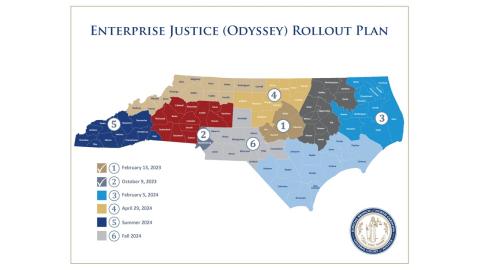eCourts Expansion Announced for 2024
Article contents

UPDATE:
- eCourts Expands to Nearly Half of State’s Population - April 2024
- eCourts Expansion in Western NC (Track 5) Set for July 22, 2024
- eCourts is Now Live in Twelve Additional Counties - February 5, 2024
The North Carolina Administrative Office of the Courts (NCAOC) on Friday announced additional go-live plans for counties transitioning from paper files to Enterprise Justice (Odyssey), the state's cloud-hosted digital case management system, which currently serves Harnett, Johnston, Lee, Mecklenburg, and Wake counties.
As announced November 1, 2023, twelve northeastern counties that comprise Track 3 of the statewide upgrade to Enterprise Justice will go-live on February 5, 2024, and Track 4 will include Alamance, Chatham, Durham, Franklin, Granville, Guilford, Orange, Person, Vance, and Warren counties.
Today, the NCAOC announced that Track 4 will go-live on April 29, 2024, and provided county groupings for Track 5 and Track 6, which will go-live in the Summer and Fall of 2024, respectively:

Counties that are not in Tracks 1-6 will go-live in 2025. The transition from paper records to Enterprise Justice, which will include North Carolina’s business courts, is planned for completion by the end of 2025 with appellate courts soon following.
“Enterprise Justice has accepted over 600,000 electronic filings and supports tens of thousands of daily searches for digital court records in North Carolina’s largest population centers and five counties, jurisdictions serving nearly three million people,” said NCAOC Director Ryan Boyce. “We are excited to continue partnering with legal communities across our state to expand digital access to justice for the benefit of all North Carolinians.”
By replacing paper processes with cloud-hosted online access, Enterprise Justice empowers the public with electronic filing and a free online search Portal to display court records and case events. As Enterprise Justice expands statewide, millions more North Carolinians gain mobile access to their courthouse, saving time and providing transparency.
In addition to electronic filing and records searches, the eCourts suite of applications also includes the already statewide eWarrants and Enforcement Mobile platforms, which integrate law enforcement processes with the court system, and Guide & File, a tool that helps self-represented users create and electronically file common legal actions through automated interviews. Statewide, more than 36,000 registered eWarrants users have issued 1.2 million criminal processes since the eCourts application for law enforcement replaced older systems in July 2022.
A large network of IT and software systems teams from NCAOC supports the eCourts transition through training, on-site assistance, remote monitoring, and help desk response. Several eCourts platforms already operate statewide, including eWarrants, Enforcement Mobile, and a dual-form of Guide & File.
Unlike many states where courts are managed locally, North Carolina’s unified Judicial Branch is taking a comprehensive approach to its digital transformation for every case type in all 100 counties, while integrating with other state and local agencies, including law enforcement.
The NCAOC estimates that more than 2.3 million sheets of paper have been saved during the first two phases of eCourts by transitioning five counties to electronic filing and records access over a ten-month period. Historically, roughly 30 million pieces of paper were added to court files each year in North Carolina. The historic transition from paper court records to digital files is also shifting data storage from old mainframe technology to cloud hosting and storage, allowing NCAOC to retire outdated onsite application hosting and storage infrastructure while improving cybersecurity and online accessibility long-term.
Preparations and walkthroughs for each track of the eCourts transition begin months in advance to train court officials and the public on new technologies and processes, install improved network infrastructure in courthouses, customize programming integrations, and migrate case event data and court records from mainframe indexes and paper to a dynamic cloud-hosted platform.
Register for eCourts trainings and access education materials, screenshot reference guides, FAQs, and other resources supporting the transition, at NCcourts.gov/eCourts.